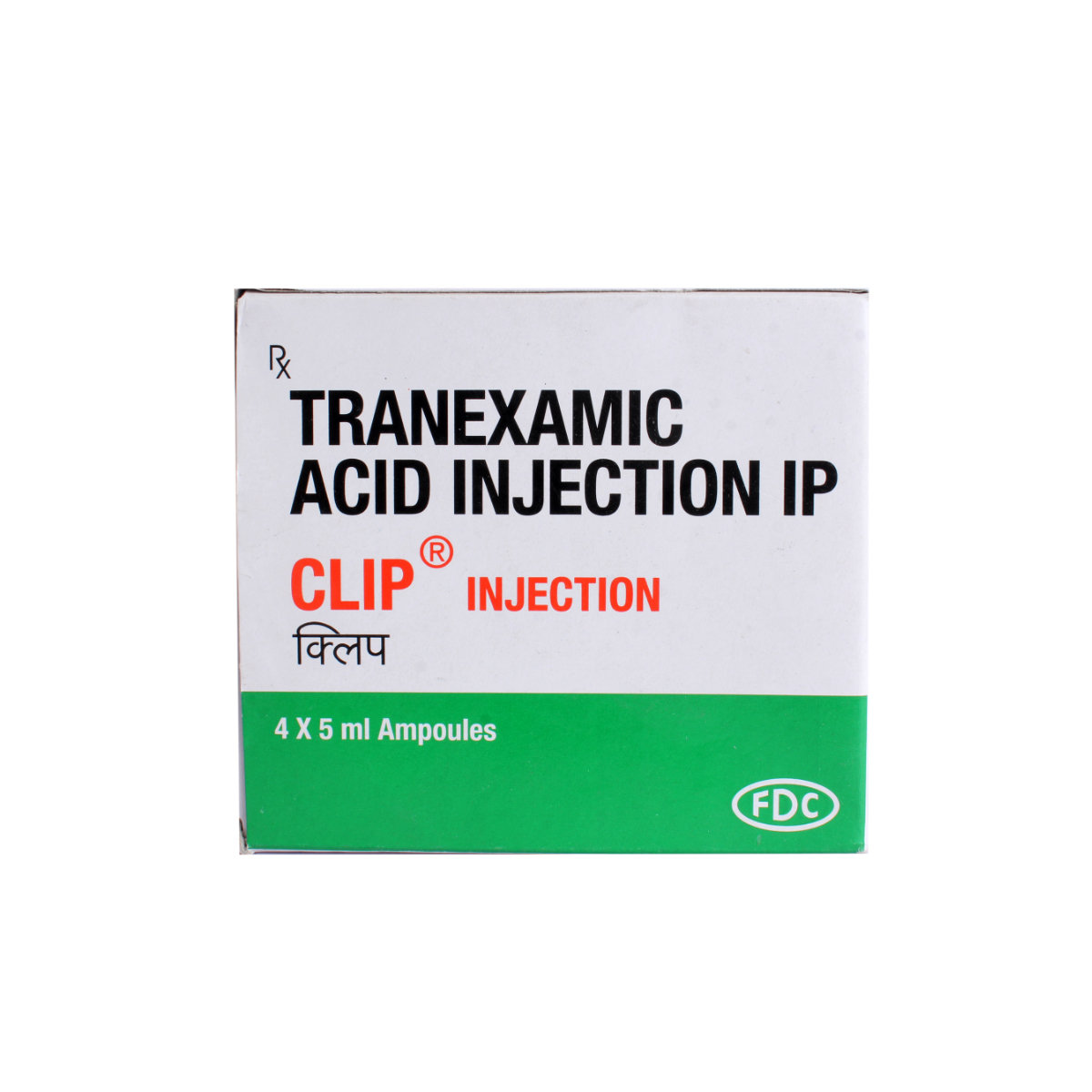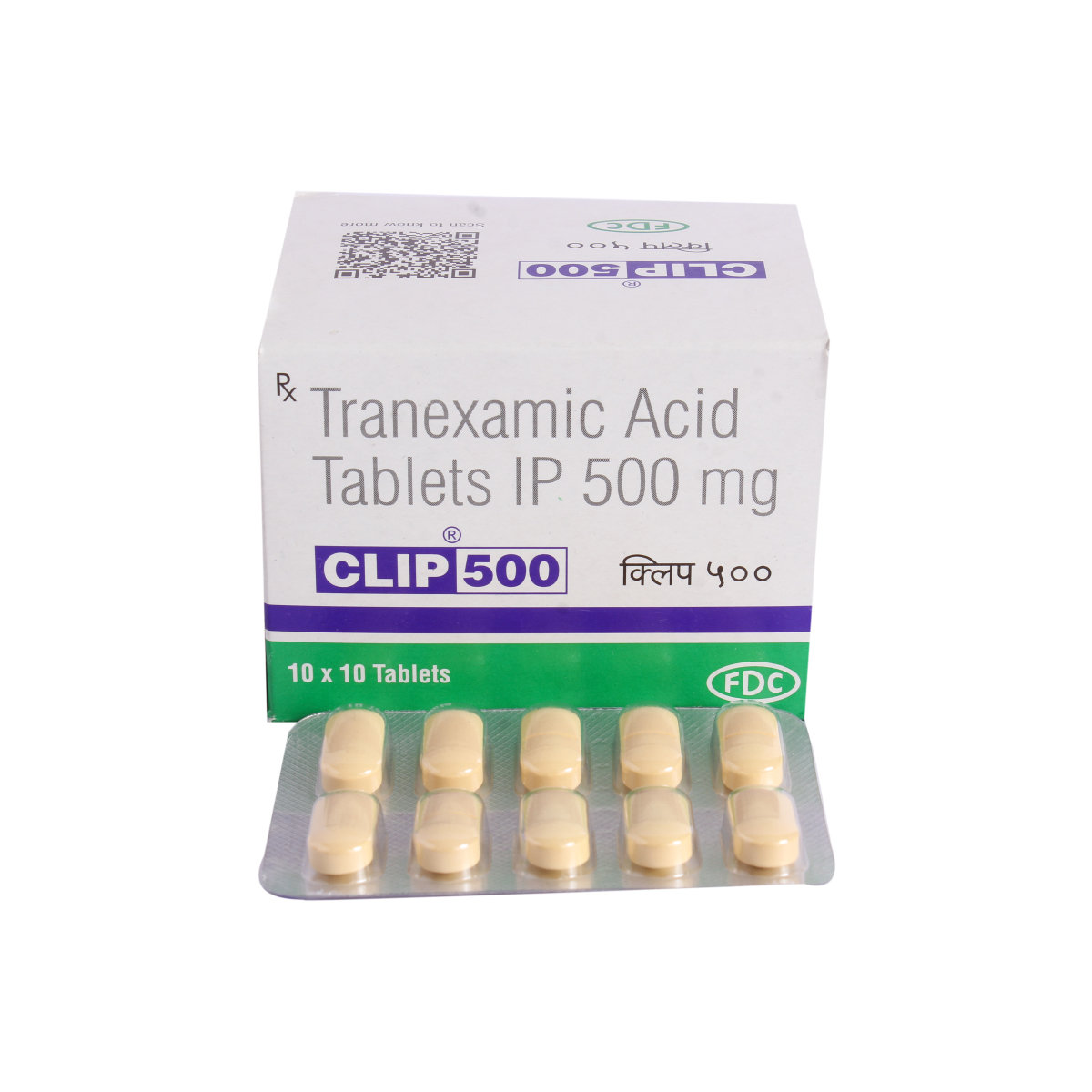Tranexamic Acid
About Tranexamic Acid
Tranexamic Acid belongs to the class of medications called ‘anti-fibrinolytic drugs’ used to treat abnormal or unwanted bleeding. It is used to control bleeding in conditions such as heavy periods (menorrhagia), nose bleeds (epistaxis), cervical surgery (conization of the cervix), prostate surgery (post-prostatectomy), bladder surgery (post-cystectomy), bleeding inside the eye (traumatic hyphaema) and a hereditary disease called angioneurotic edema (HANO). The solution form of this medicine is used before tooth removal (dental extraction) in hemophiliacs (people who bleed more easily than normal).
Tranexamic Acid contains ‘tranexamic acid’, which belongs to the class of ‘anti-fibrinolytic agents’. It is generally used for short-term treatment of bleeding. It acts by regulating the breakdown of blood clots. It blocks the release and action of plasmin which is an enzyme essential for the breakdown of clots present in the blood. This effect helps to slow down the bleeding.
Tranexamic Acid should be taken as advised by your physician. The dose and duration of the medicine will be decided by your doctor based on your health condition. Tranexamic Acid may not cause any side effects when used orally. However, some patients may experience certain side effects, such as feeling sick (nausea), diarrhea, and itchy skin. These side effects usually go away on their own. If you develop any other serious side effects, such as vision problems while using Tranexamic Acid, consult your doctor immediately.
Tranexamic Acid should be avoided if you are allergic to it or any other ingredients present in it. Do not take this medicine if you have a history of kidney disease, thrombosis (formation of blood clots in the blood vessels), disseminated intravascular coagulation (a disease where blood clots form throughout your body) , and seizures (fits). Inform your doctor if you are taking birth control pills or fibrinolytic agents (medicines that dissolve blood clots). Also, inform your doctor if you are pregnant, planning to become pregnant or breastfeeding.
Uses of Tranexamic Acid
Medicinal Benefits
Tranexamic Acid contains ‘tranexamic acid’, which belongs to the class of ‘anti-fibrinolytic agents’. It acts by regulating the breakdown of blood clots in the body. It blocks the release and action of plasmin, an enzyme essential for the breakdown of clots in the blood. This effect helps to slow down abnormal bleeding.
Directions for Use
Storage
Side Effects of Tranexamic Acid
- Nausea
- Diarrhea
- Itchy skin
- Pain at the injection site
- Vision problems
- Vomiting
Drug Warnings
Before taking Tranexamic Acid, inform your doctor if you notice blood in your urine (except during periods), or have a history of uncontrollable bleeding, disseminated intravascular coagulation (DIC) (a disease where blood clots form throughout your body), irregular periods, and kidney disease. Also, inform your doctor if you or your family has a history of thrombosis (formation of blood clots in the blood vessels). Let your doctor know if you are taking medicine to treat a hereditary disease called angioneurotic edema (HANO) every day for a long time. Your doctor may advise regular eye tests and blood tests to check your vision problems and also liver/kidney functioning. Inform your doctor if you are using birth control pills, including the patch, vaginal ring, and an intrauterine device (IUD), as there is a risk of deep vein thrombosis (a condition in which a blood clot is formed in the deeper vein, mostly the legs). Inform your doctor if you are using fibrinolytic agents (drugs that break blood clots) such as streptokinase, as they may stop the effect of Tranexamic Acid. Inform your doctor if you are pregnant, planning to become pregnant or breastfeeding.
Drug Interactions
Drug-drug interactions: Tranexamic Acid may interact with birth control pills, fibrinolytic drugs (streptokinase, urokinase, reteplase, alteplase, and tenecteplase, etc.), an antipsychotic drug (chlorpromazine), and a drug used to treat blood cancer (tretinoin) and progestins (levonorgestrel).
Drug-food interactions: No interactions found.
Drug-disease interactions: Tranexamic Acid should not be used in patients with a history of colour vision defect, active intravascular clotting, intracranial haemorrhage, seizures (fits) and renal dysfunction.
Drug-Drug Interactions Checker List:
Safety Advice

Alcohol
cautionTranexamic Acid may not interact with alcohol. However, avoid the consumption of alcohol as it may worsen your health condition.

Pregnancy
cautionTranexamic Acid is a category B medicine and may not cause toxic effects to the fetus. However, it should be used in pregnant women only when prescribed by a doctor. Your doctor will administer it only if the benefits overweigh the risk.

Breast Feeding
cautionTranexamic Acid should be used in breastfeeding mothers only if prescribed by a doctor. Your doctor will administer it only if the benefits overweigh the risk.

Driving
safe if prescribedThe oral for of tranexamic acid may cause dizziness. Hence it is advised to avoid driving or operating machines for some period after receiving Tranexamic Acid.

Liver
cautionTranexamic Acid should be used with caution in patients with liver diseases. Your doctor may suggest for a dose adjustment if needed based on your health condition.

Kidney
cautionTranexamic Acid should be used with caution in patients with kidney diseases. Your doctor may suggest for a dose adjustment if needed based on your health condition.

Children
cautionTranexamic Acid should be used in children below 12 years of age only if clinically needed. Dose adjustments are done by the child specialist.
Habit Forming
Diet & Lifestyle Advise
- Ask your doctor about the preferred exercises to do based on your health condition.
- Stay hydrated and consume plenty of fluids. Fluids are necessary to maintain blood flow in your body.
- Consume fresh fruits and vegetables. Consult a dietitian and prepare a diet plan. Eating healthy can help you to recover faster.
Special Advise
- Your doctor may suggest regular eye check-ups while taking Tranexamic Acid.
- Increased risk of blood clot formation when co-administered with a combination oral contraceptive. Consult your doctor before taking any medication.
Patients Concern
Disease/Condition Glossary
Menorrhagia: It is a condition characterized by heavy or prolonged bleeding during menstrual periods which last for more than seven days
Epistaxis: Bleeding from the nose when the blood vessels of the nose lining burst. This can occur due to dryness or nose injury.
Post-operative bleeding: It is bleeding after surgery due to the blood vessel rupture. Some people may experience mild to severe bleeding due to cuts made during surgery.
Traumatic hyphema: It is a condition characterized by the presence of blood in the anterior chamber of the eye due to a blunt injury. This condition may also result in vision loss.
Hereditary angioneurotic edema (HANO): It is a hereditary disease that causes recurrent painless swelling under the skin.
Dental Procedures: It is a procedure involving dental issues during which bleeding occurs.
FAQs
Tranexamic Acid is an 'antifibrinolytic agent' that can stop the bleeding effectively. It stops the breakdown of blood clots by inhibiting the action of plasmin (an enzyme essential for the breakdown of blood clots).
Tranexamic Acid should be used for short-term to control bleeding. Do not use it frequently or for long-term without consulting your doctor.
Tranexamic Acid cannot stop periods. It can only reduce the bleeding in cases of heavy bleeding. However, do not use this medicine for any indication without consulting your doctor.
Tranexamic Acid should not be taken with birth control pills, including the vaginal ring, intrauterine device and the patch, as there is a risk of ‘deep vein thrombosis’ (formation of a blood clot in the deeper vein, mostly legs). So, inform your doctor before taking Tranexamic Acid, if you are taking any birth control pills.
Tranexamic Acid may not affect fertility. It is used to stop abnormal bleeding during heavy periods. Inform your doctor before using this medicine to avoid any unwanted side-effects.
Tranexamic Acid can be used in children with caution. Your doctor may make dose adjustments based on the age, weight and health condition of your child.






